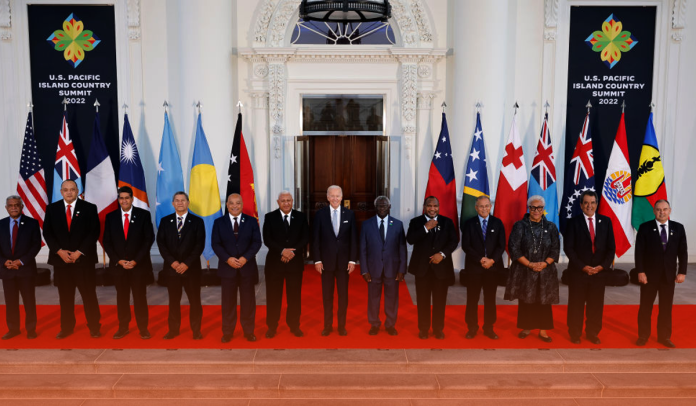The President of the United States of America is going to announce the launch of a new embassy in Cook Islands and Niue, which could be a strategy to stop the Chinese influence in the South Pacific region. The announcement of the new diplomatic mission came on Sunday as President Biden is scheduled to welcome Pacific Island leaders in the two-day US-Pacific Pacific Island Forum Summit in Washington DC. Climate change can be a major topic of talk. Biden has taken steps to get closer and make relations stronger in the Pacific to counter the rising Chinese influence in the region.
Two senior administration officials confirmed the announcement of embassies after rising concerns and uncertainty about the matter. The formal declaration has not taken place yet. Press secretary of the White House expressed that President Biden would use the summit as a key to strengthen ties with Pacific nations and further see how they can benefit each other. He also said that challenges like development, powerful economic growth, and climate change would be included in discussions. All the individuals from the 18 members of the forum were scheduled to go to a Baltimore Ravens Football game and then to appear in a Coast Guard Cutter in Baltimore Harbor, where they would be briefed about tackling illegal fishing and other maritime challenges.
Pacific leaders held the rich countries responsible for having a significant impact on climate change, and they claim the influenced nations provide loans to weaker countries and shift the responsibilities to them. White House revealed a particular strategy for the Pacific region in last year’s summit. That plan says America would help the Pacific leaders in fighting against some of the major issues like Over-fishing and Maritime security.
US Pledged To Provide $810m To Pacific Islands Last Year
In that plan last year, the White House pledged to provide $810 million dollars as aid to Pacific Island nations for the next decade, which also includes $130m for the efforts to counter climate change. Director of Pacific Island Programs at Australia’s Lowy Institute, Meg Keen, expressed the American government has opened new embassies and USAID offices in the Pacific region since last year’s Summit, but Congress has not approved the funds yet. She added Pacific nations were interested in making the ties stronger with America again but didn’t want to be a part of any militarization or escalation.
All the 18 members of the forum are given below:
- Australia,
- The Cook Islands
- Kiribati
- Micronesia
- Fiji
- Nauru
- French Polynesia
- Palau
- Papua New Guinea
- Republic of Marshall Islands
- New Caledonia
- New Zealand
- Tuvalu
- Vanuatu
- Niue
- Samoa
- Solomon Islands
- Tonga
America claimed that 18 members of the Forum were to send their top elected official or foreign minister to the Summit. An official claimed that the Prime Minister of the Solomon Islands (one of 18 members), Manasseh Sogavare, was at the United Nations General Assembly last week and had not waited for the Summit, which made the administration disappointed. The Solomon Islands signed a security agreement with China last year.

Source: Web
World Leaders In A Race To Reach The Region
Not only the US and China seem interested in Pacific Islands. India, Indonesia, South Korea, and other nations are in a race to get in ties with this strategically important region. For example, Papua New Guinea (PNG), once a sleepy town with a limited reach, has now become a host to several nations. Now, it is hosting many countries, and world leaders are in a queue to reach there.
China’s recently reappointed foreign minister Wang Yi went on a tour to eight Pacific Island nations last year and visited PNG at the end of his trip. White House Secretary of the State, Antony Blinken visited the capital, Mores-by, in May this year, and then US Secretary of Defense Lloyd Austin went on a trip to this country in July. The Pacific Ocean came under spotlights just after the United Stated tried to engage in ties with these nations to tackle the growing Chinese influence; before this, the region was long-ignored by the whole world.
In May, Indian Prime Minister Modi was on a visit to PNG, and in July, Indonesian President Joko Widodo laded there and met PNG’s Prime Minister. It is not only Papua New Guinea, which is a point of interest to world leaders, but other Pacific nations are also getting attention.





